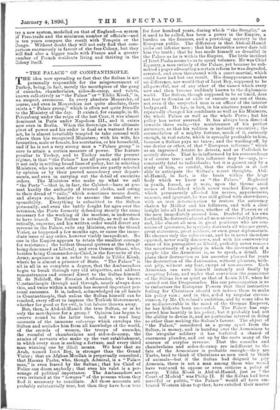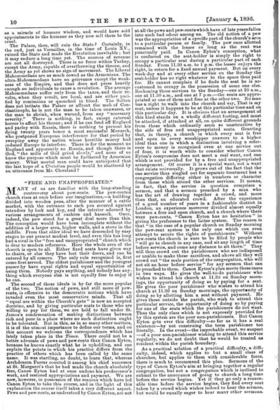"THE PALACE" OF CONSTANTINOPLE. T HE idea now spreading so fast
that the Sultan is not personally responsible for the misgovernment of Turkey, being, in fact, merely the mouthpiece of the gang A eunuchs, chamberlains, aides-de-camp, and valets, known collectively as "the Palace" or "Yildiz Kiosk," is, we suspect, erroneous. In every absolute Monarchy, of course, and even in Monarchies not quite absolute, there exists a "Palace group," which is often not quite friendly to the Ministry of the day. It existed, for example, in St. Petersburg under the reign of the last Czar, it was almost dominant in Paris under Napoleon III., and it exists now even in Berlin. When the Sovereign is the ultimate pivot of power and his order is final as a warrant for an act, he is almost invariably tempted to take counsel with others than his recognised Ministers; with his wife, his favourites, male or female, his secretaries, or his household, and if he is not a very strong man a "Palace group" is sure to attain a certain measure of power. The feature peculiar to Turkey, and to Turkey under the present regime, is that "the Palace" has all power, and exercises it not only in settling broad lines of policy, but in selecting Ministers, who in most other countries are partly selected by opinion or by their proved ascendency over depart- ments, and even in carrying out the detail of executive orders. The Ministers who make up what we call "the Porte "—that is, in fact, the Cabinet—have at pre- sent hardly the authority of trusted clerks, and owing to their dread of "exile," which sometimes means death, and always ruin, hesitate to assume the smallest re- sponsibility. Everything is submitted to the Sultan personally, and even the battle fought for ages over the revenues, the Porte formerly defending stoutly the sums necessary fur the working of the machine, is understood to have ceased. The Sultan is actually, as well as theo- retically, supreme, and his written order would divert any revenue to the Palace, exile any Minister, even the Grand Vizier, as happened a few months ago, or cause the imme- diate issue ot any order, however visibly inexpedient. No one in the Empire appears to retain the smallest courage for resistance ; the boldest General quivers at the idea of being denounced as Liberal; and even Osman G-hazi, who, besides being Commander-in-Chief, is the favourite of the Army, acquiesces in an order to reside in Yildiz Kiosk, where he is almost a prisoner of State. "The Palace" is all in all in so complete a degree, that the Ambassadors begin to break through very old etiquettes, and address retnonstrances and counsel direct to the Sultan himself. M. de Nelidoff, the Russian Ambassador, who knows Constantinople through and through, nearly always does this, and twice within a month has secured important per- sonal successes. It is, indeed, acknowledged on all hands in Constantinople, that unless the Sultan himself can be reached, every effort to impress the Turkish Government, 'whether for good or for evil, is but labour thrown away. But, then, is Abd-ul-Hamid the true Sultan, or is he only the mouthpiece for a group ? Opinion has begun to swerve round to the latter view, and we read long accounts of the immense entourage which envelops the Sultan and secludes him from all knowledge of the world, of the crowds of women, the troops of eunuchs, the roomful of chamberlains and aides-de-camp, the armies of servants who make up the vast establishment, in which every man is seeking a fortune, and every third man winning one by illicit means. We hear that an Arab, named Izze,t Bey, is stronger than the Grand Vizier ; that an Afghan Moollah is perpetually consulted; that Hassan Pasha, who, though Admiral, is a "Palace man," is even feared by the Sultan; that his Chief of Police can doom anybody ; that even his valet is a per- sonage of political importance. The Ambassadors are even irritated at the "lowness" of the persons whom they find it necessary to conciliate. All these accounts are probably substantially true, but then they have been true for four hundred years, during which "the Seraglio," as it used to be called, has been a power in the Empire, a burden on the finances, and a provoking mystery to the European public. The difference is that Abd-ul-Hamid picks out inferior men ; that his favourites never dare tell him the truth ; that he has made himself as dreadful in the Palace as he is within the Empire. The little incident of Izzet Pasha seems to us to speak volumes. He was Chief Equerry, a man entirely of the Palace, yet because he sub- mitted a paper advocating a certain reform he was degraded, arrested, and even threatened with a court-martial, which could have had but one result. His disappearance makes 110 difference, nor would that of Izzet Bey, supposed to be all-powerful, nor of any other of the names which every now and then become suddenly known to the diplomatic world. The Sultan, though supposed to be so timid, does not fear to dismiss or exile or execute any one of them, not even if the suspected man is an officer of the interior bodyguard. Be has, in fact, in his nineteen years of rule repeatedly changed his confidants as well as his Ministers, the whole Palace as well as the whole Porte ; but his policy has never swerved. It has always been directed towards three ends,—the maintenance of his perfect autocracy, so that his volition is instantly executive ; the accumulation of a mighty fortune, much of it, curiously enough, in real estate, which is specially profitable to him, because a Sultan pays no taxes; and the warding-off, by one device or other, of that "European influence" which as an ingrained Asiatic he detests, and as Padishah he acutely dreads. That he is influenced by his surroundings is of course true ; and this influence may be—nay, is— constantly fatal to individuals ; but it is gained only by a study of him, so careful, that the student is at last able to anticipate the Sultan's secret thoughts. Abd- uldTamid, in fact, is the brain within the huge body which we know as "the Palace." Neglected in youth, forced, as it were, upon the throne amid scenes of bloodshed which never reached Europe, and which permanently affected his nerves, apprehensive, atnemic, and ignorant, be was still gifted with shrewdness, with an iron determination to restore the autocracy shaken by Midhat and his followers, and with a clear insight into all bad motives, whether of the Powers or of the men immediately around him. Doubtful of his own foothold, he distrusts almost all men as conceivably plotters, and, like almost all men in great positions who are con- scious of ignorance, he specially distrusts all who are great, great statesmen, great soldiers, or even great diplomatists. He chooses only the subset vieut, and he is never therefore opposed, never really discu-ss, and with his overweening sense of his prerogative as Khalif, probably never realises the monstrosity of a policy in which the destruction of a people like the Armenian is, so to speak, a detail. He plans their destruction as his ancestor planned for years the destruction of the Janissaries, without pleasure, with- out pity, without any fear, except of non-success. Each Armenian can save himself instantly and finally by accepting Islam, and under that conviction the conscience of the Sultan lies as quiet as that of Louis XIV. when he carried out the Dragonnades. His one preoccupation is so to embarrass the European Powers that their instinctive feeling for Christians should not induce them to make his policy vain ; and in this, aided by singular circum- stances, by Mr. Cleveland's ambition, and by some idea to us uudiscoverable in the mind of the German Emperor, he has hitherto been successful. The Palace has sup- ported him heartily in his policy, but it probably had not the ability to devise it, and no particular interest in doing so other than seeking the Sultan's favour. The object of "the Palace," considered as a group apart from the Sultan, is money, and in handing over the Armenians to the irregular soldiery it has forfeited a chandi of enormous plunder, and cut up by the roots many of the sources of surplus revenue. That the eunuchs and chamberlains and aides-de-camp are indifferent to the fate of the Armenians is probable enough—they are Turks, bred to think of Christians as men used to think of animals—but if the Sultan had deigned to pity Armenia, there is not a man among them who wou:d have 'ventured to oppose or even criticise a policy of mercy. Yildiz Kiosk is Abd-ttl-Hamid, just as "the Court of Madrid" was Philip II. If the Sultan bad been merciful or politic, "the Palace" would all have em- braced Western ideas together, have extolled their master as a miracle of humane wisdom, and would have sold appointments to the humane as they now sell them to the cruel.
The Palace, then, will ruin the State Certainly, in the end, just as Versailles, in the time of Louis XV., ruined the State and made the Revolution inevitable ; but it may endure a long time yet. The sources of revenue are not all destroyed. There is no force within Turkey, except the Army, capable of overthrowing the throne, and the Army as yet shows no sign of movement. The Liberal Mahommedans are as much cowed as the Armenians. The ultra-Mahommedans have no grievance except the weak- ness of the Empire, and that does not press heavily enough on individuals to cause a revolution. The average Mahommedans suffer only from the taxes, and their re- volts, when they revolt, are local, and are either paci- fied by remissions or quenched in blood. The Sultan does not irritate the Palace or affront the mob of Con- stantinople, he is not the man to be taken unawares, or the man to shrink, when warned, from any " necessary severity." There is nothing, in fact, except external horror to affect his throne ; and if he can fend off England and parley with Russia, there is nothing to prevent his dying twenty years hence a most successful Monarch, who postponed European interference for that period by sweeping away the nation whose horrible misery had induced Europe to interfere. There is for the moment no England and apparently no Russia, and though there is God, "the mills of God grind slowly," and none of us know the purpose which must be furthered by Armenian misery. What mortal man could have anticipated that the last hope of a Christian people would be shattered by an utterance from Mr. Cleveland ?















































 Previous page
Previous page